#are we in Monty Python's sketch
Explore tagged Tumblr posts
Text
IN WHAT ORDER
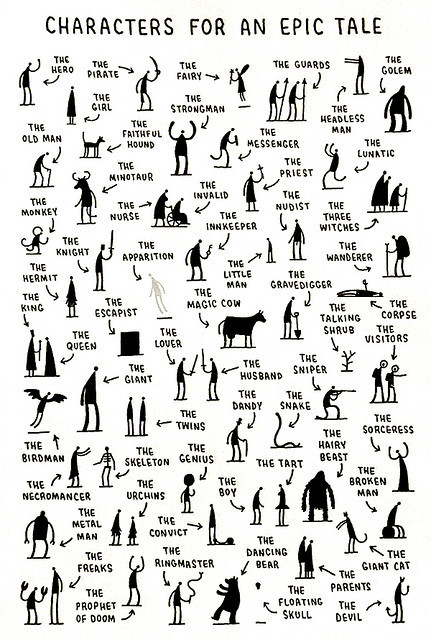
Tom Gauld - Personajes epicos
#order of the phoenix#order of attack#order of templars#alphabetical order#numerical order#what order#there is no order#order#how can you see this and say “order”#IT'S NOT ROWS AND COLUMNS#IT'S PURE CHAOS#what are you#are you a mason#do you see order in chaos#ordo ab chao#is this once again a masonry trick#freemasonry#are we in Monty Python's sketch#are we doing a bit#can I be doing the fish while you kiss my forehead dressed as the chocolate box
14K notes
·
View notes
Note
Your neighbor is trying to SET FIRE to your house??? That's crazy.
Sorta, he keeps setting fire to his own house and we have to decide if it's worth calling the fire brigade or not. Two months ago when I called them, the operator sighed and went 'Oh it's [this house], I assume?'
#We live on a terrace so every time he leaves his fireplace unattended our house fills with smoke/petrol fumes#he keeps leaving firewood out in the rain and then uses petrol to start a fire because it won't light#admittedly that last part isn't entirely he fault because the roof of his shed blew away in 2022#but last year he left his fireplace open with a large piece of wood trailing onto the floor and it set his floorboards on fire#and he wasn't even at home at the time#I have been keeping the discord updated about this on and off#it does feel like living in a monty python sketch#asks#anonymous#personal logs
10 notes
·
View notes
Text
Despite him not being a writer or comedian and not really having a comedy background, I honestly think David Tennant is so so suited for a sketch comedy. Not just as a guest on something like SNL (although that would be great too) but as a main cast member in something
#it’s not going to happen#also idk many sketch shows that are still running (esp in the uk)#I mean he has done one or two guest spots which were great#I think we seriously underestimate his ability for physical comedy#he could totally fit in a Monty python-esque role#also ppl tend to not see comedy and especially the silly stuff as lucrative so it’s unlikely anyone’s going to offer him a recurring role#david tennant#sketch comedy#also he would love dressing up we know this#as not lucrative lol
6 notes
·
View notes
Text
new challenge, write about Lolita without yet another Proust reference. I'm not reading Proust!!!!
#the fact the author stopped to reference a Monty Python sketch about Proust...#We Have To Go Deeper
1 note
·
View note
Text
i personally think that the best straw hat team dynamic will always be the punk hazard away team of luffy zoro usopp and robin. because like usopp is always the proverbial straight man to the crews antics but he always just deals with it because 9/10 times hes actually correct, however in this case he's locked in a room with the 3 craziest crew members who simply Do Not Care because theyre genetic freaks who are not normal. luffy is always a funny maniac and zoro is always a stoic enabler but then you add robin to the mix as the third monster who has zoros ruthlessness but also luffys inherent silliness (and in dressrosa we see how funny usopp-robin can be as a dynamic) eho exponentially improves the other two and you get a full on monty python anime sketch. of course you have the lake sequence as like the perfect microcosm of how the group works but luffy will just decide on something ridiculous and robin will then be like fantasic plan captain lets do xyz to do just that and then zoro the goonpilled followercell will just be like on it boss and throughout all this usopps blood pressure enters quadruple digits because theyre trying to get past a literal army with only the guitar hero pro controller since they left the rubberband controller on the ship. usopp will be like "holy shit this is tense i hope they dont just crazy murder kill everyone" and then luffy zoro and robin will be like "man usopp looks stressed maybe if we crazy murder kill everyone he'll feel better :)"
#zerav meme#one piece#what if 3 dieties and a hero had to build furniture#god the devil the devil 2 and their funny tengu guy
4K notes
·
View notes
Link
I had the image of Compassion's manager leaving them an irritated voicemail: "After as many weeks you've missed showing up for work, I sure hope you're dead. 'Cause if you're not, I'll kill you."
Like, after a long enough time of trying to find compassion in its absence, in one's care providers and caregivers and staff and frontline providers and basically everyone, one will start to seriously contemplate that it is, in fact, *no more.* That it has *ceased to be.* That it's *snuffed it.* That it's *off the twig* and *kicked the bucket* That compassion is *bleeding demised*. That it's *shuffled off this mortal choir* and *joined the bleedin' choir invisible.* That what we have here on our hands is: **ex-compassion.** And the supplier had better replace it, then.
#compassion fatigue#is it dead#faker panic#dead compassion sketch#monty python#ish#wherefore art thou compassion#compassion called in sick for the rest of forever#sorry#can we interest you in a lovely DNR instead?#maybe some fresh bureaucracy?#steve here is really great at gaslighting#show 'em steve
20 notes
·
View notes
Text
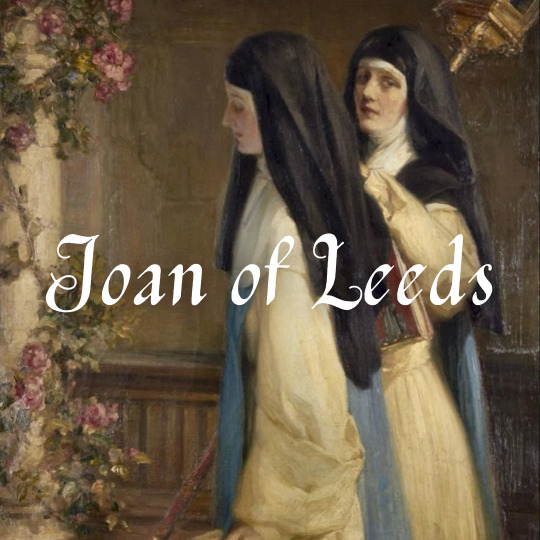
"A marginal note written in Latin and buried deep within one of the 16 heavy registers used by to record the business of the archbishops of York between 1304 and 1405 first alerted archivists to the adventures of the runaway nun. “To warn Joan of Leeds, lately nun of the house of St Clement by York, that she should return to her house,” runs the note written by archbishop William Melton and dated to 1318.
Melton, writing to inform the Dean of Beverley about the “scandalous rumour” he had heard about the arrival of the Benedictine nun Joan, claimed that Joan had “impudently cast aside the propriety of religion and the modesty of her sex”, and “out of a malicious mind simulating a bodily illness, she pretended to be dead, not dreading for the health of her soul, and with the help of numerous of her accomplices, evildoers, with malice aforethought, crafted a dummy in the likeness of her body in order to mislead the devoted faithful and she had no shame in procuring its burial in a sacred space amongst the religious of that place”.
After faking her own death, he continued, “and, in a cunning, nefarious manner … having turned her back on decency and the good of religion, seduced by indecency, she involved herself irreverently and perverted her path of life arrogantly to the way of carnal lust and away from poverty and obedience, and, having broken her vows and discarded the religious habit, she now wanders at large to the notorious peril to her soul and to the scandal of all of her order.”
Professor Sarah Rees Jones, principal investigator on the project, said the story of Joan’s escape, which she and her team discovered last week, was “extraordinary – like a Monty Python sketch”.
The scribes did not record whether Joan was returned to the convent or not. “Unfortunately, and this is really frustrating, we don’t know the outcome of the case,” said Rees Jones. “There are quite a lot of cases of monks and nuns who left their religious house. We don’t always get the full detail or know what the outcome was.”"
"Archive shows medieval nun faked her own death to escape convent", Alison Flood
#this isn't a recent discovery but i love this story#joan of leeds#history#women in history#women's history#14th century#england#english history#british history#medieval women#medieval history#middle ages#historyedit
134 notes
·
View notes
Text
Happy 99th Birthday David Attenborough!
1. 1954 - Wildlife for the masses
Sir David Attenborough joined the BBC as a trainee in 1952, having only ever watched one television programme.
His early career included the high octane round-table debate, Animal, Vegetable, Mineral? But the tenacious 28-year-old was seeking new ways to make films and a life outside the television studio. The result was the hit series 'Zoo Quest,' which combined live studio presentation with footage shot on location for the first time. It brought rare animals - including chimpanzees, pythons and birds of paradise - into viewers' living rooms and proved wildlife programmes could attract big audiences.
2. 1965 - Civilisation – in colour!
We can't attribute Western civilisation to Attenborough, but we can give him the credit for one of its greatest achievements: colour television.
As Controller of BBC Two, he oversaw the first ever-colour broadcasts in Europe, rushing to beat rival German broadcasters by three weeks. He then commissioned the critically-acclaimed series Civilisation, written and presented by art historian Kenneth Clark. The Ascent of Man, presented by humanist scientist Jacob Bronowski, soon followed. These landmark series helped inaugurate a new kind of television documentary, putting history, culture and science on screen in ways never seen before.
3. 1969 - Monty Python's Flying Circus
By now BBC Director of Programmes, Attenborough continued to innovate and reinvent television – but this time in the world of comedy.
He commissioned Monty Python's Flying Circus, a cult sketch show which made stars out of John Cleese, Michael Palin, Terry Jones, Eric Idle, Graham Chapman and Terry Gilliam. The show was a global phenomenon, inspiring generations of comedians around the world. In Britain, Python became part of the nation's cultural DNA, encapsulating a recognisably British eccentricity and spawning popular catchphrases and figures of speech.
4. 1975 - Back to nature
Long before Bear Grylls slept in a camel carcass (ew), Sir David was trekking through uncharted wilderness to film some of the remotest people on earth.
Freed from his role as a BBC executive, Attenborough went back to nature to become an explorer. He made a series of programmes about tribes, some so isolated it's thought they hadn't been contacted by Europeans before Sir David's arrival. He immersed himself in their cultures, wearing nothing but a loin cloth while filming in the Solomon Islands. In showing us ways of life so different from our own, Sir David helped us understand both the diversity and universality of the human experience.
5. 1979 - Inventing epics
Now a staple of any self-respecting Brit’s television diet, Sir David helped invent the natural history documentary as we know it today.
In the late 1970s, he took inspiration from series like Civilisation and The Ascent of Man and travelled the globe to deliver his definitive take on the wonders of the natural world. A natural history programme of this scale and ambition had never been attempted before. The result was Life on Earth, a televisual feast which used stunning photography and innovative camera techniques to show animals in their natural habitats. It’s estimated that 500 million people watched the series worldwide.
6. 1994 - A rose by any other name…
While filming The Private Life of Plants, Sir David noticed the world's largest flowering plant had quite a racy name – the Amorphophallus Titanum.
Instead, he gave it another name in his script - titum arum - coining the plant's common name in the process. But as well as naming species, many plants and animals have been named after Sir David. They include a flightless beetle, a species of hawkweed found only in the Brecon Beacons and a long-necked dinosaur called the Attenborosaurus.
7. 2001 - Your first glimpse
Without the ambition and persistence of Attenborough and his collaborators, millions of us may never have seen some of the world's rarest creatures.
It's been a constant theme throughout his career, beginning with Zoo Quest in the 1950s, when he famously caught the elusive Komodo Dragon on film for the first time. But in 2001, we were given an insight into a strange new world, when Attenborough narrated The Blue Planet. The series introduced millions to the wonders of the deep sea and was the first time some species, including the hairy angler fish and the Dumbo octopus, were captured on film.
8. 2015 - Pushing boundaries
From colour broadcasts to 3D television, Sir David has always been at the forefront of pioneering technology in broadcasting.
In 2015, he dived 1,000ft in a submersible off the Australian coast to film previously unseen parts of the Great Barrier Reef, breaking the record for the deepest ever dive on the reef. He also collaborated with the Natural History Museum on a virtual reality project, and filmed BBC series – such as Planet Earth II and Wild Isles – in Ultra HD. Next time you tune into a major Attenborough documentary, you can be pretty sure you're witnessing a breakthrough in future broadcasting technology.
9. Today - Saving the world
Sir David has always said he didn't start making programmes with conservation in mind - he simply enjoyed observing the natural world.
But as time passed, he became aware that the animals and habitats he was filming were under threat. He's authored documentaries which overtly tackle environmental issues but prefers a subtler approach, showcasing the natural world in the hope we might be inspired to preserve it. Sir David has done more than almost any other person to help millions of us understand and appreciate the wonders of the world around us.
youtube
53 notes
·
View notes
Text
From Gary Wright’s music video for “Don’t Try To Own Me.”
“Although at times he could be reflective and withdrawn, to me he definitely wasn’t the ‘quiet Beatle,’ as the media portrayed him. Once he got on a roll, he didn’t stop talking until he finished his story. At his memorial service, Eric Idle said, ‘We all know that the press called him the “quiet Beatle,” but for those of us who knew him well, we knew different. Once he started talking, he never stopped.’ He also had a great sense of humor. Many times as we were listening to a playback in the control room, he would jump out of his chair and start dancing around like a wild man. At other times, he would make up some moves and play ‘air saxophone,’ as though he was a sax player in Little Richard’s band. But most of all he loved Monty Python and would regularly repeat their hilarious sketches verbatim. It was all part of his personality to laugh and joke around and then pick up a guitar from his incredible collection and launch into a beautiful song that would make you cry.” - Gary Wright, Dream Weaver: Music, Meditation, And My Friendship With George Harrison (2014) (x)
86 notes
·
View notes
Text
If we sent gahan and jwds on a double date I wonder how they'd all get along. Kang Yohan and Han Juwon trying to outspend each other? Yohan and Dongsik humiliating their boys by telling them how pretty they are? A huge argument erupts over the superiority of cops or judges? Whose old man is more unexpectedly cut? Everyone in unison shouting "No one wants to go fishing, Dongsik!"? "This is Yohan, he didn't kill his brother." "Pleased to meet you, I didn't kill my sister." Trauma competition in the style of the Monty Python Four Yorkshiremen sketch? "My lake house is bigger than your lake house."
Who hits who first? Who kisses who first? Is it WWIII or do they all end up in one of Yohan's carnival ground-sized beds?
89 notes
·
View notes
Text
Terry Jones Vs. Alan Alda
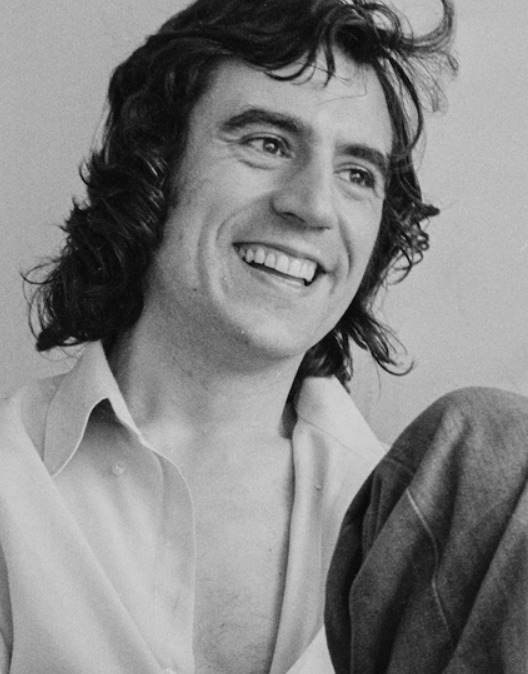
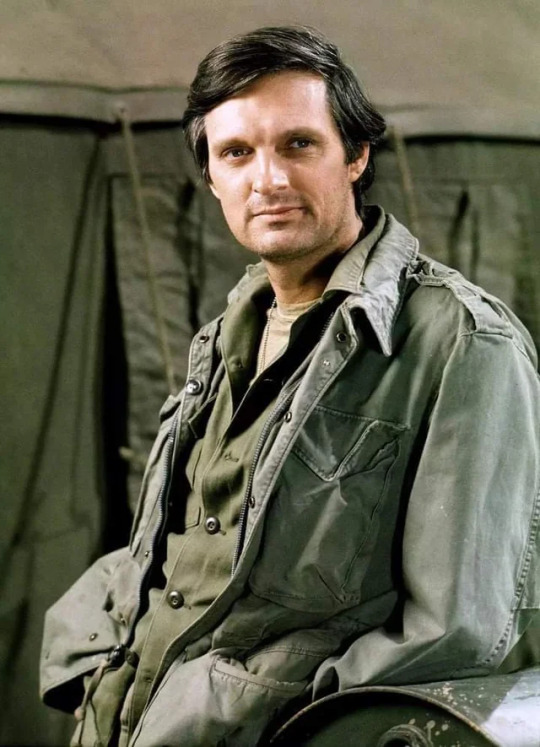
Propaganda
Terry Jones - (Monty Python's Flying Circus, Do Not Adjust Your Set) - I wish I could tell you all in a few sentences just how handsome, funny, intelligent, kind and soft-spoken Terry Jones was. How passionate he was about the things he loved, lacing his interests (like e.g. history) throughout all the projects he was working on. How he was supposedly always laughing and giggling when writing and reading out sketches. How he admired the art of silent movies/Buster Keaton and was obsessed with writing poems as a child. How he was described as a wonderful friend and a little as if he carried his own world around with him. But there is simply too much to tell and I adore him too much to pick the best facts, so this will have to do
Alan Alda - (M*A*S*H) - He is both the saddest wettest little meow meow and your kindly grandfather and your favourite eccentric uncle (mom's side). Somehow it works. Passionate Democrat, feminist, great writer, he and his books are hilarious. Did a cartwheel when he won an Emmy! How he met his wife is the best meet cute of the last two centuries, and they've now been married over 60 years!!!
Master Poll List | How to submit propaganda | What is vintage? (FAQ)
Additional propaganda below the cut
Alan Alda:
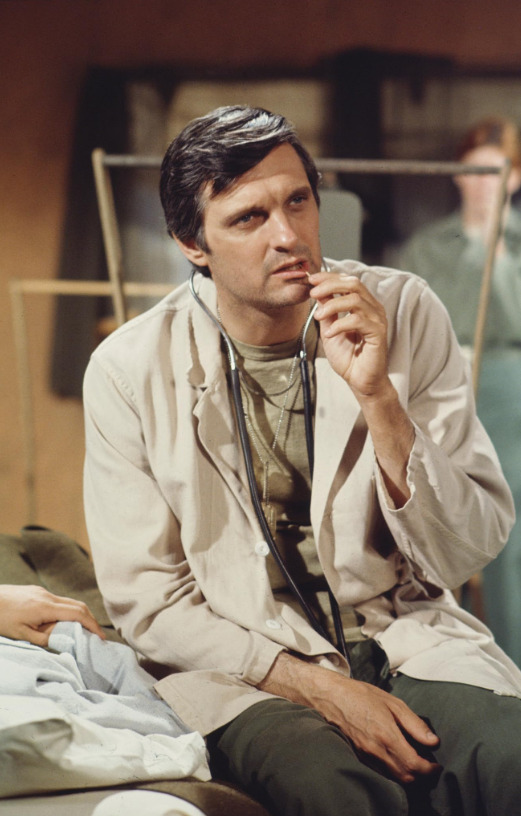
he’s just so good in MASH
youtube
he put so much bisexuality into hawkeye i think it fundamentally changed me when i was little and watching mash for the first time. anyway do we all know the story about how he met his wife when they were at a party together and they were the only two people eating the cake that fell on the floor and he fell in love with her over her laugh. i just think hes neat :) i love when theres a strange looking man. also feel it necessary to say that the guy that wrote the book mash was based on wrote himself as hawkeye and HATED alda's hawkeye bc he displayed his morals too much (alda had it in his contract for the show that every episode had to have an operating room scene bc otherwise you arent backdropping the fact that war is Not fun. actually. he almost didnt take the role bc he thought a war comedy would make too much light of the horrors)
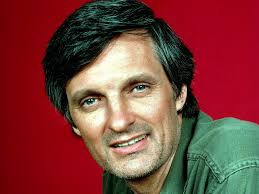
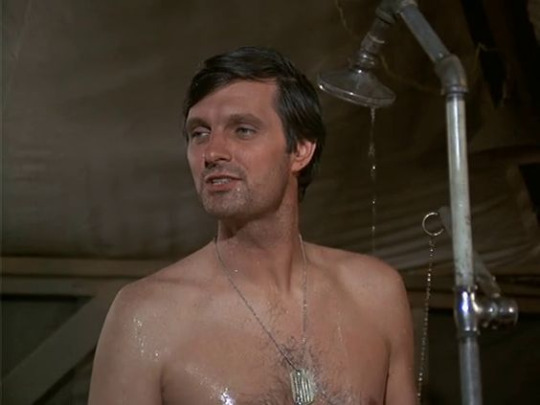
please please please use this picture of him, he's so hot in it
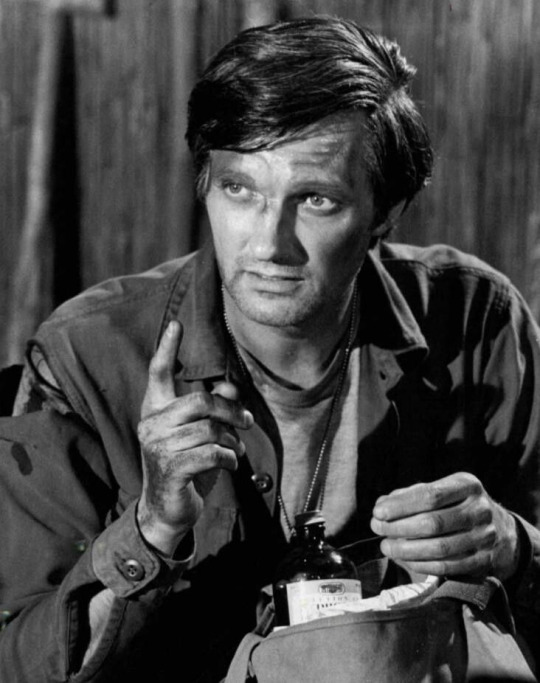
His comedic delivery in MASH...
youtube
The story of how he met his wife is charming and sweet, and they've now been married 65 years
Just look at him. He's the most beautiful man I've ever seen but also he's completely average. He's got a weak jawlines and a round face and these big soft eyes and he's just so beautiful. He's capable of playing a silly charismatic sitcom protagonist in one scene, and a jaded army surgeon haunted by the deaths he's witnessed in the next. He's so hot that my dad once told me he decided to apply to medical school because of how much he was attracted to Hawkeye Pierce. That's literally how I learned that my father was bisexual.
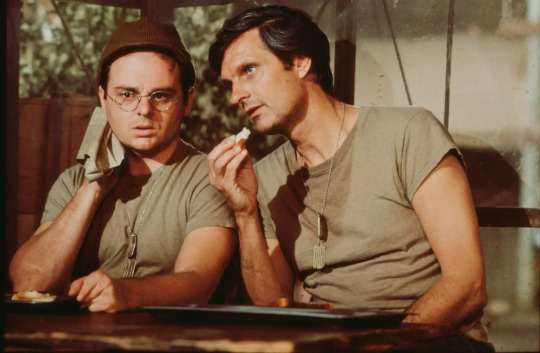
He's also just a really great dude? He's been outspoken about his political beliefs for a long time, and has always been strongly and vocally anti-war, pro-feminist, and pro lgbt. He served a tour in the Korean war, and his experiences there informed his performance in the show. He (and honestly the entire cast, but especially him) really just soared above and beyond the standard for comedies of the day.
youtube
He's so funny and his eyes are pretty
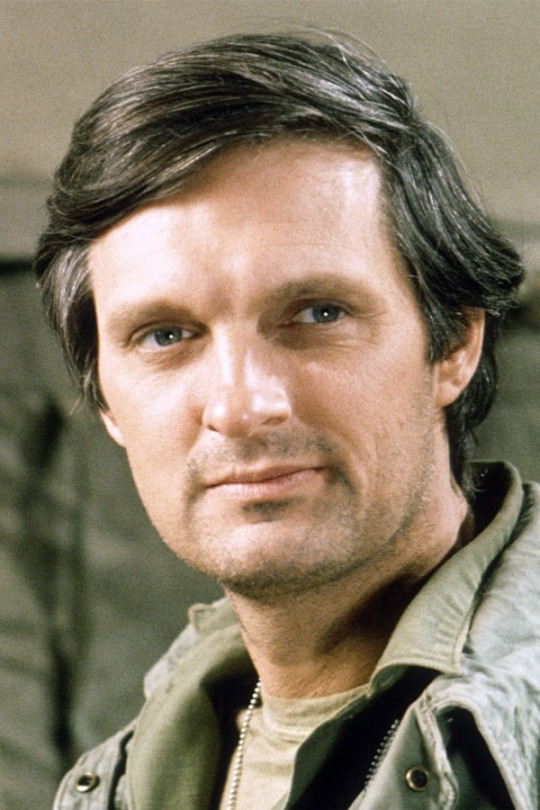
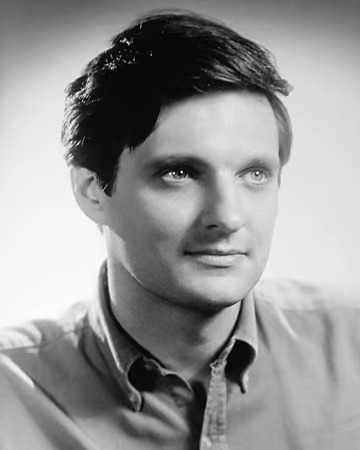
He loves and is a champion of science (Source).
83 notes
·
View notes
Text

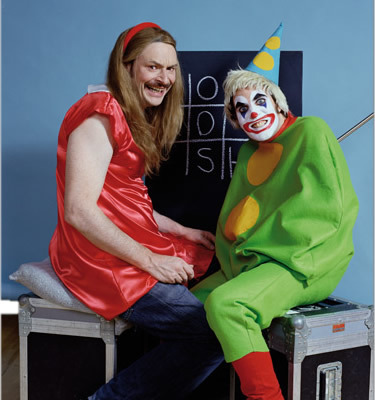
Any small child catching sight of Noel Fielding of The Mighty Boosh in his clown gear would vow never to go to the circus again. Fielding’s torso is encased in a green felt globe, his hands protruding helplessly from the bottom. From beneath lurid make-up, he flashes a deeply unsettling grin, as if auditioning for the role of a psychopathic killer in Test Card: The Movie. “I’m just popping out for some coffee,” he deadpans. “Does anybody want anything?”
His Booshmate Julian Barratt, who currently looks like the victim of back-alley gender reassignment surgery, brushes his new blond tresses away from his face and sighs. “What a job, eh?”
When the duo decided to pose as the pair from the 1970s TV test card, it didn’t take long to decide who should play which part. If you want make-up and a manic grin, Fielding’s your man. He arrives at the studio resembling a time-travelling glam-rock star: pointy boots, snug red trousers, tight T-shirt, pendant shaped like a Flying Vee guitar, alarming bone structure. In one episode of their TV series, Barratt tells Fielding, “Look at you - feather cut, the pointy features. Put you in the 1950s, you’d be imprisoned for being a witch. They’d lock you in a trunk!” He’s probably right.
Barratt carries himself like someone trying to elude capture. It’s this wary unease that defined his performance as misanthropic style journalist Dan Ashcroft in Nathan Barley, Chris Morris’s Channel 4 comedy series. Morris wanted Dan to be someone who “wasn’t really comfortable in his skin”. I ask Barratt if Dan is a version of his own personality and he looks mildly wounded. “Not really, no. There were elements of me - it’s sometimes painful to be around people who are annoying - but Dan was a bit of a tit. I didn’t really like him.”
The Mighty Boosh have already completed two successful BBC series and are currently working on a third. Fielding, 33, thinks comedy is about allowing people to feel young again. “When you’re really laughing, you feel like a little kid and nothing matters. Everyone’s trying to feel as free as they were when they were kids.” Barratt, 38, seems to regard comedy’s inner workings as an imponderable mystery. “You still don’t know why you’re funny, do you?” Fielding says. “Not really,” Barratt sighs.
After almost a decade of working together, the pair are obviously close. When the camera’s not pointed in their direction, they huddle on the studio sofa in earnest conference punctuated by giggles. There is much to discuss: “We’ve got so many things we want to do and we need a basket to put them all in,” explains Barrett. “A structural basket.”
Fielding has a different metaphor. “We know when we’ve got enough ideas. If we haven’t and we try to write, it’s a bit weird. It’s like loading a gun and not having enough bullets.”
They first met in 1996, when Fielding went to see Barratt doing stand-up in High Wycombe. There had been less auspicious nights. Barratt recalls, “I ran off stage at my first gig. Halfway through it, I forgot my lines and didn’t know what to do, so I just ran out of the building down towards a lake. I was going to throw myself in, but the compere came out and said, 'No, it’s going well, come back and finish the gig!’ ”
The two share enthusiasms (Captain Beefheart, Monty Python, Mr Benn) and Barratt launched their collaboration by asking Fielding if he wanted to write the new Goodies. “We wanted to be a gang rather than a sketch troupe,” he says. From the start, their combination of absurdist wit, far-fetched narratives and bizarre musical interludes was the stuff of cult success. Audiences either entered their world and found them the funniest thing around, or they didn’t get them at all. “We used to have to convince people we were funny,” Barratt says, “and it didn’t always work.”
It did, however, work well enough to earn them nominations or awards at three consecutive Edinburgh festivals. A radio series followed and they finally made it to the nation’s TV screens in 2004. Earlier this year, they returned to touring. They get offers all the time, but having got this far on their own idiosyncratic terms, they have no desire to work according to anyone else’s.
“If Tim Burton called up and said, 'I’m making a film about two white Americans who go and become Red Indians’, I’m sure we’d jump at the chance,” Fielding says. “But if it’s, 'Do you want to be in this sitcom that’s a bit like Coupling?’ I’d rather shoot myself.”
When did you first find something really funny?
Noel Fielding: My nan used to look after me in the summer holidays and she had a cat with one eye. It used to walk into walls and tables. I used to think it was hilarious. It was a slapstick cat.
Who are your comedy inspirations?
Julian Barrett: I loved the Goodies’ sense of adventure.
NF: The Young Ones was the first thing I really liked. I was so young I didn’t really know what students were. I just thought they were some men who lived in a house.
What’s not funny?
JB: Cancer?
NF: It can be, though, can’t it?
JB: Yeah, sometimes a tumour will make me laugh.
When did you last laugh?
NF: I laugh all the time. I’m slightly simple. I went to a festival in Cambridge last weekend and there were men standing on a wheelchair and getting their friends to push them down a muddy hill and really hurting themselves. One of them had a fur coat, a dress underneath, massive boots and a witch’s hat. It was so stupid that everyone was laughing at them. It was quite freeing, actually.
What’s the funniest thing that’s ever happened to you?
NF: Once I got stuck in a suit of armour. I had to be a knight in Al Murray’s show for two minutes. I had a gig afterwards and there was no one there backstage, so I couldn’t get out of it. I had to run next door and do the gig in a suit of armour. Al thought it was the best thing ever. “You should do that every night! It’s brilliant!” he said.
What’s the secret of comedy?
JB: The secret of comedy is don’t grow up. That’s why some comedians are a nightmare, because they never grow up.
Tell us a joke
NF: You stop hearing proper jokes when you’re a comedian. I’m always slightly disappointed by real jokes. There’s a lot of pressure to understand them and laugh at them. Occasionally we come up with a proper joke by accident and we almost apologise.
· The Mighty Boosh debut live DVD is released on November 13.
x
32 notes
·
View notes
Text
Ranking my fandoms by how cringe they are (/lh and /ns):
Hollow Knight - One of the least cringy of the bunch. Your favorite video game is Dark Souls with bugs and you proudly admit it. All your fanart is either adorable or nightmare-inducing. You stand head and shoulders above most other gaming fandoms by virtue of being only a little queerphobic, and most of the time it feels like it's because you don't feel comfortable with it/its pronouns. Take your time, you'll get there eventually. Your main low point is that you'll lose your collective minds at even the slightest whiff of Silksong news, but even then that wasn't a bad thing when you were five minutes from mailing a pipe bomb to Unity's headquarters after they pulled that stupid download fee bullshit.
Sky - Nicest of the bunch. Almost all of your art is adorable and tooth-rottingly wholesome. Every now and then you pop out a theory, headcanon or fan work that would make the Hollow Knight fanbase proud, then go right back to complaining about IAP prices as if nothing happened.
Fallen London - You all act like characters in a Monty Python sketch. You're very insular because trying to explain Fallen London's plot to people makes you sound like you just escaped the Royal Bethlehem. Psychoanalysis and Knifegate are your two greatest enemies. One of you should probably write a dictionary on what the hell all your acronyms stand for, or else someone's going to start playing SMEN with a very inappropriate idea of what that story actually entails in their head.
Hetalia - Somehow - somehow - you are still attached to the stupid country men even in the Year of Our Lord 2024. Your favorite hobby is describing historical events via sexual innuendos and vice versa. You actually try to do your research now, but you are haunted by the spectre of what you were circa 2014. I would encourage you to embrace the cringe, but we all know what that cringe looked like, so instead embrace the cringe of using your bachelor's in world history to justify shipping France and Scotland.
Hermitcraft - You're all either 30-somethings or literal children, and those of you that aren't are all refugees from the Dream SMP fandom. You used to fight over whether or not shipping is acceptable, but ever since Double Life happened you've now just kind of agreed to leave each other alone. All your fanfic writers have created a batshit insane shared universe solely to justify making their favorite a catboy/catgirl. You live in fear of the CCs discovering you and your secret stash of Scarian fanart, even though it's probably already been passed around their discord server several times by now.
12 notes
·
View notes
Text
Stocktaking in the Basement
Aziraphale's Edinburgh Journey: Part 3
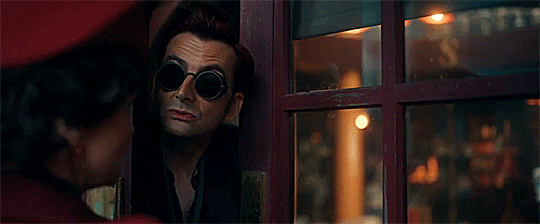
Usually one would think of going through their memories as a learning experience as more of a "rummaging around in the attic" metaphor, since the brain, the keeper of memories, is in the highest part of our bodies. But one of S2's underlying themes is the looming Second Coming and the resurrection of the dead, so its underground that we need to head - to the basement.
Aziraphale does a great deal of "stocktaking in the basement" during his trip to Edinburgh. He recalls the encounter with the body-snatcher Elspeth and her companion wee Morag in 1827 on the way up, has his memory jolted by the statue of Gabriel to something more recent, then thinks about what happened in 1941 on the way back. We are largely going to deal with aspects of the 1827 minisode in this meta, and some possible implications for S3.
Lets have a look at why this year, 1827, was chosen for this minisode. The Anatomy Act of 1832 gave doctors and medical students legal permission to use donated bodies for research and educational purposes, and was made so to stop the distressing trade of body snatching that was occurring at the time. But this minisode isn't necessarily about stopping that activity, rather the reasons for doing it in the first place. Looking at Strong's Concordance, as we must, in the Greek, 1827 gives us "convince" or "prove to be in the wrong." This sounds about right for this minisode, which includes the conversation about poverty inducing more opportunities to be wicked, which somehow leads to holiness, from the book. The minisode shows how Aziraphale has this idea turned around for him - he's convinced otherwise, and shown how his initial beliefs about the practice turn out to be wrong.
Also, around 1827 is the time when the building of private mausoleums was at its peak. A mausoleum was (and still is) a display of wealth, so featuring one here plays into the story in the minisode of the virtues of poverty versus the rich. (It's also a call back to the origin of the Bentley's number plate, which was written on a mausoleum in a Monty Python sketch.)
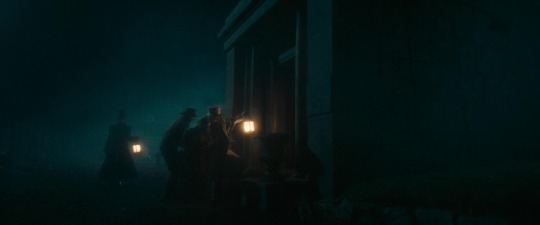
Digging Up the Past
Shax does her own stocktaking when she receives the above push-back from Crowley, and realizes that Aziraphale is not in the bookshop at all at that moment, and goes looking for him. Later, she digs up his own dirty past to taunt him with, in an effort to make him crack and give up Gabriel.
But why is Aziraphale digging up this particular memory at this time? We know he is fond of Edinburgh and has visited many times, so this particular memory must contain something of importance for us to see.
There is the title of the minisode, some Masonic symbology and the metaphorical act of the snatched bodies as the dead rising from their graves which all point us in the direction of the Second Coming and Judgement Day, which we will cover in Part 4, so we'll put that to the side for the moment.
Changing Sides
Let's have a look at some of the blocking of the scenes in the Resurrectionists minisode. This wont cover everything, so if you do go back to have another look at it yourself, do pay close attention to who stands where.
When we first meet Crowley and Aziraphale in 1827, they are standing on what we think of as their "normal" sides, angel on the right and demon on the left. Elspeth, caught in the act of body snatching, is even further to the left, the real demon on the scene, which actually pushes Crowley back to the middle ground.
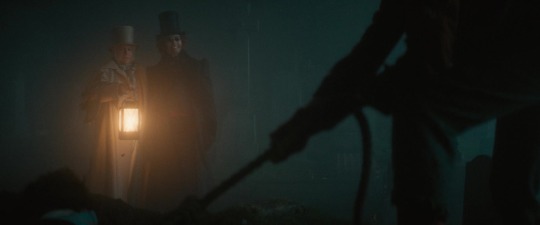
Straight afterwards, we see all three of them walking together through the streets of Edinburgh. Crowley is still in the middle, but now Elspeth is in the angel's position and Aziraphale on the far left as a demon, as they all discuss the virtues of poverty. Oh dear, Aziraphale, you're losing the argument here, and losing badly!

Inside Mr Dalrymple's rooms, Aziraphale decides to take matters into his own hands, where he thinks he is doing the right thing, and miracles the first body into soup. Elspeth is caught innocently in the middle of this, and Dalrymple is on the demonic left.

A conversation is had with Dalrymple following this. Crowley is hidden in the right-hand chair, Aziraphale, who needs to be swayed, is in the middle, and Dalrymple is still on the demonic left.
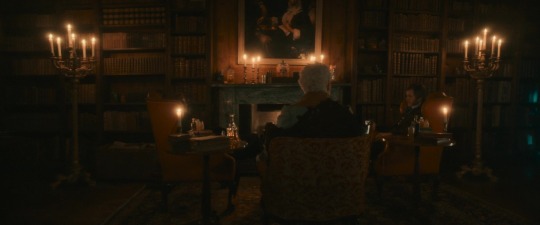
After heading back to the cemetery for another body, Crowley and Aziraphale inspect some of the protective measures set up to guard the graves. Crowley is still on the moral right, questioning if the rich are more worthy of being protected from body snatchers than the poor.

Despite changing his mind about body snatching, Aziraphale still ends up on the wrong side of the argument in the end. As a giant Crowley looks down on the two of them, its Aziraphale standing on the demonic left side as the virtues of poverty lose out once more.

Timely Lessons
Back to the fireside chat with Dalrymple. We have this heartfelt reaction from Aziraphale when he learns the preserved specimen he is holding came from a seven-year-old boy.
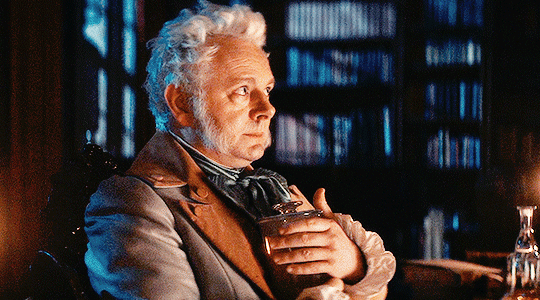
AZIRAPHALE: [takes the jar] Well, that's a foot. So it's definitely not a foot. [laughs] DALRYMPLE: That's my point. If you two smart gentlemen can't identify it, then what are my students to make of it? I removed this tumor from a seven-year-old boy. AZIRAPHALE: Oh. Oh dear. And… Is he…? DALRYMPLE: [shakes head] And that is why we need a steady supply of cadavers. We need to cut. If we can't cut, we can't learn. If we can't learn more, a lot more, then how on earth are we going to win the battle against monstrosities like this one? I'm just trying to save lives and teach students. I either end up with a knighthood or condemned as a resurrectionist and hanging from a rope.
This, I feel, is an important lesson for them, and it seems for Aziraphale in particular. Why? This part focuses more on his reaction to the tumor, rather than Crowley's, and when we focus on Aziraphale it has ramifications for the future.*
A physical problem is usually easily identified (such as the foot). But what if the problem is invisible, because its on the inside? How do you see into a body, find a problem and make it visible, if you have not been presented with this problem before? Or perhaps you know something is wrong, but don't know what to call it?
It doesn't even have to be physical, it can be a mental, or a psychological problem. One still has to learn how to "see" the problem, to identify what it is (such as a particular pattern of behaviour) and to know the best course of action to overcome it.
Crowley wishing for more murderers to facilitate Dalrymple's research is one thing, but not being able to save a 7 year-old boy...this is the theme of the death of innocent children we've seen repeated throughout the series (the Flood, Job's children, the aborted attempt on Adam, the Crucifixion, and the implications around Crowley's Fall, to name a few.)
This also plays into the "representation matters" theme from the end - you can't be what you can't see.
This is not a lesson about the fact that they care, because they do, but how they learn to see the real problem in the first place.** I'll be interested to see the matching scenes/parallels to this in S3.
The Two Dalrymples
It has not gone unremarked that there is a Dalrymple mentioned in S1 as well - Witchfinder Colonel Dalrymple, who made the fancy Thundergun that was taken to Tadfield to shoot the antichrist with.

Now we can talk about the connection between the two Dalrymples - they are both about removing "monstrosities" from humanity.
Take the line in the passage above: "If we can't learn more, a lot more, then how on earth are we going to win the battle against monstrosities like this one?"
As I've mentioned before, the root of the word monster is from the Latin for monstrum, "a divine omen (of misfortune)," but also monstrare, which means "to point out," which bring us back to this scene in S1, on the tarmac of the Tadfield Airbase:

Aziraphale took Witchfinder Colonel Dalrymple's Thundergun to remove the monstrosity that was Adam the antichrist to save humanity, and Mr Dalrymple the surgeon is trying to learn how to remove and save humanity from the monstrosity we know as cancer. I'm just making a spot now on my S3 bingo card for a third Dalrymple mention, that will no doubt have some connection to the removal of monsters and/or monstrosities from the world.
Balancing the Books
The final bit of stocktaking might just be the coldest part of the whole recall process.
When Aziraphale calls from the cemetery in Edinburgh, he mentions Dalrymple's fate to Crowley:
AZIRAPHALE: Oh, do you really think so? Um, Crowley… Do you remember Dr. Dalrymple, The one who bought, err… CROWLEY: Wee Morag's body. Not a doctor… A mister, yes! Yes, whatever happened to him? AZIRAPHALE: [reading pamphlet] He left Edinburgh in disgrace. And then he killed himself. CROWLEY: Mmm.
Mmm, indeed. They might have saved Elspeth from Hell to meet up with wee Morag again, but the count of souls was still balanced out in the end, with Dalrymple heading the other way. The last time we see him he is still on the demonic LHS of the screen in blocking as he pays for wee Morag's body. Hell had him marked well in advance of his demise.
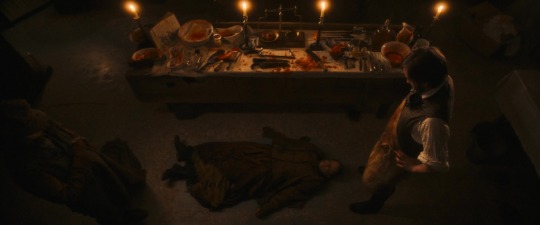
Time to move on to Part 4: Judgment Day, where we look at all the signs that the End Times are approaching. Again.
Thanks to @vidavalor for the thematic inspiration for this post.
For further reading:
You Say Potato, I Say Excellent! Or blocking, accents and legacy of morality tales in ‘The Resurrectionists’ minisode PART II by @pommedepersephone
The linked post at the beginning Historical Analysis: class and injustice in 'The Ressurrectionists' minisode by @bowtiepastabitch is here.
An intro to Elspeth and wee Morag being parallel characters to Aziraphale and Crowley by @good-soupmens I'm going to follow up on this in Part 5.
*I explained in Part 2 that I believe we are being shown the future through Aziraphale and his parallel characters, Beelzebub and Maggie. Another reason for this is that in S1 is that Anathema is one of his parallels, and she is also caught up with living in the future through the prophecies of Agnes Nutter. In contrast, Crowley's story, and that of his parallels, such as Gabriel and Newt, are about the past and trying to live the life you want that isn't bound by expectations. Urrgghh, I can see I might have to expand on this somewhere later.
**Crowley, with most of his story in the past, shows us an example of this with his "looking where the furniture isn't" comment.
The other posts in this series can be found here:
Part 1: Detective Aziraphale Part 2: Aziraphale-Beelzebub Parallels Part 4: Judgement Day Part 5: I Know Where I'm Going
#good omens#good omens 2#good omens meta#aziraphale#mr dalrymple#witchfinder colonel dalrymple#elspeth and wee morag#good omens 1827#edinburgh 1827#the resurrectionists#scene blocking#body snatchers#strong's concordance
80 notes
·
View notes
Text
The time my very lovely art teacher met Michael Palin
Today, while I was at school, I went to get some colouring pens from the art class for my artwork, and one of my art teachers (the one who sounds kinda Welsh and who is very very lovely indeed <33) kindly let me borrow some.
Then, one of the other art teachers (the one who sounds like a regular Southerner, and who is also very lovely) came in, and we had a lovely chat about Monty Python, and my heart just went “YIPEE!!” with absolute JOY frfr (cuz nobody my age that I know irl watches or even knows about Monty Python unfortunately 😔❤️)!!! I should mention that my other teacher (the Welsh-sounding one) knows that I love Monty Python cuz last December before the Christmas break, when I was doing my art project in the art room, we (as well as the class) watched random Monty Python sketches (such as the Cheese Shop sketch) and scenes from the films (like “Holy Grail” and “Life of Brian”) to make the day even funnier and enjoyable and we had an absolute blast watching it and truly made my day very special frfr <33
Anyway, fast forward to today, as me, my (Welsh sounding) art teacher and my (Southerner) art teacher were talking about MP, my (W-S) teacher mentioned that she met SIR MICHAEL PALIN HIMSELF!!! I was very excited and I told her “wait REALLY!???” and she was like “YEAH FR!!”
She told me and the (S) teacher that she met in him in London as she was working with a theatre producer at the time a real long time ago. Her job was serving coffees and stuff, and as she was serving coffee to Michael, he pretended to look like he was POISONED by the coffee she served him, and we all burst out laughing cuz it was so funny 🤣🤣🤣!!! As my (W-S) teacher said, he “has a wicked sense of humour, and is very lovely indeed” and that fr made my day frfr <33
BUT NOT ONLY THAT, my (S) teacher also told us that her fave movie is “Life of Brian”, and iirc she told us that she and her family really love the ex-Leper scene from the film and they quote the scene so much (“Alms for an ex-Leper?”) , and as well as that they also mimic the moves the ex-Leper did, and she then preceded to move like the ex-Leper in the classroom and that truly broke us into tears frfr 😂😂 (tho she didn’t do the hops which was understandable as there was other students in the classroom so she didn’t want to potentially accidentally hit them lol)
Anyway, it was a very lovely story and I really enjoyed that conversation frfr, and it truly brightened my day today a bit frfr <333




17 notes
·
View notes
Text
Hugh Laurie is an amazingly talented actor, comedian, singer, writer, producer and director.
I know about his rowing past: how during his time at Cambridge in the 1970s and 1980s, he chose to follow in the footsteps of his father, Ran Laurie who had won a medal in the 1948 Olympics, HL training foreight hours a day on end, hoping to achieve success.
Unfortunately, at the age of 20, presumably in June 1979, HL had to give up rowing altogether after being diagnosed with Glandular fever. He joined the Cambridge Footlights, a sketch comedy troupe which is also the oldest one in the UK and which has produced many award-winning acts including Monty Python.
During his time at Footlights, HL met actress Emma Thompson and even the two broke up after being in a relationship, she introduced him to Stephen Fry, the two forming the double act of "Fry and Laurie".
In 1980- 1981, HL was the president of the Footlights, Thompson vice-president. They along with other members of the Cambridge Footlights Revue later travelled to the Edinburgh Fringe Festival and won the first ever Perrier Comedy Award, becoming the first Cambridge group to earn the award since John Cleese's Cambridge Footlights Revue had first won it back in 1963.
And that's how HL began his career in comedy, eventually going on to play various roles in the English comedy sitcom, "Blackadder" and even the TV show, "A Bit of Fry and Laurie".
I sometimes wonder what would have happened if HL hadn't come down with glandular fever. Maybe he could've fulfilled his dreams of participating in the Olympics.
Then again, I'm grateful HL went into comedy and later, acting because if he hadn't, we wouldn't have gotten to see him play Dr. Gregory House in "House MD".
#hugh laurie#gregory house#greg house#house md#cambridge footlights#blackadder ii#blackadder the third#blackadder goes forth#a bit of fry and laurie
15 notes
·
View notes